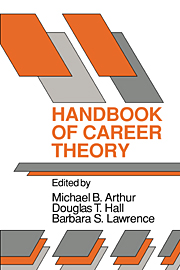Book contents
- Frontmatter
- Contents
- List of contributors
- Preface
- PART I CURRENT APPROACHES TO THE STUDY OF CAREERS
- PART II NEW IDEAS FOR THE STUDY OF CAREERS
- Introduction to Part II
- 11 People as sculptors versus sculpture: the roles of personality and personal control in organizations
- 12 Work, stress, and careers: a preventive approach to maintaining organizational health
- 13 Re-visioning career concepts: a feminist invitation
- 14 Reciprocity at work: the separate, yet inseparable possibilities for individual and organizational development
- 15 Career improvisation in self-designing organizations
- 16 Organization career systems and employee misperceptions
- 17 Blue-collar careers: meaning and choice in a world of constraints
- 18 A political perspective on careers: interests, networks, and environments
- 19 Rites of passage in work careers
- 20 Pin stripes, power ties, and personal relationships: the economics of career strategy
- 21 Rhetoric in bureaucratic careers: managing the meaning of management success
- 22 The internal and external career: a theoretical and cross-cultural perspective
- PART III FUTURE DIRECTIONS FOR THE DEVELOPMENT OF CAREER THEORY
- Name index
- Subject index
15 - Career improvisation in self-designing organizations
Published online by Cambridge University Press: 05 June 2012
- Frontmatter
- Contents
- List of contributors
- Preface
- PART I CURRENT APPROACHES TO THE STUDY OF CAREERS
- PART II NEW IDEAS FOR THE STUDY OF CAREERS
- Introduction to Part II
- 11 People as sculptors versus sculpture: the roles of personality and personal control in organizations
- 12 Work, stress, and careers: a preventive approach to maintaining organizational health
- 13 Re-visioning career concepts: a feminist invitation
- 14 Reciprocity at work: the separate, yet inseparable possibilities for individual and organizational development
- 15 Career improvisation in self-designing organizations
- 16 Organization career systems and employee misperceptions
- 17 Blue-collar careers: meaning and choice in a world of constraints
- 18 A political perspective on careers: interests, networks, and environments
- 19 Rites of passage in work careers
- 20 Pin stripes, power ties, and personal relationships: the economics of career strategy
- 21 Rhetoric in bureaucratic careers: managing the meaning of management success
- 22 The internal and external career: a theoretical and cross-cultural perspective
- PART III FUTURE DIRECTIONS FOR THE DEVELOPMENT OF CAREER THEORY
- Name index
- Subject index
Summary
We want to have certainties and no doubts – results and no experiments – without even seeing that certainties can arise only through doubt and results only through experiment.
C. G. Jung, 1978To follow up a problem in the company library, to experiment with work methods, or to study new materials or markets should be working rights, not only for researchers and executives, but for all employees.
B. L. T. Hedberg, 1984Doubt and experimentation have become institutionalized in self-designing organizations, which are social forms built to deal with rapid environmental change. These self-designing forms have distinctive properties that pose unique issues for people who build and study careers.
If we define careers as “the individually perceived sequence of attitudes and behaviors associated with work-related experiences and activities over the span of a person's life” (Hall, 1976, p. 4), then we know little about the experiences, activities, and perceptions that are created when a career unfolds in a flexible system where change is continuous, experiments are routine, and growth replaces advancement as a measure of success. We know little about what it means to have a career in a system that does not use traditional external markers to signify progress, advancement, and movement in some consistent direction. This chapter suggests a starting point from which researchers can explore career issues in selfdesigning organizations.
We first describe six characteristics of self-designing systems and then contrast these systems with others in the organizational literature that appear to be similar. Using these descriptions as background, we then propose that career paths in self-designing systems originate from subjective rather than objective sources.
- Type
- Chapter
- Information
- Handbook of Career Theory , pp. 313 - 328Publisher: Cambridge University PressPrint publication year: 1989
- 60
- Cited by



